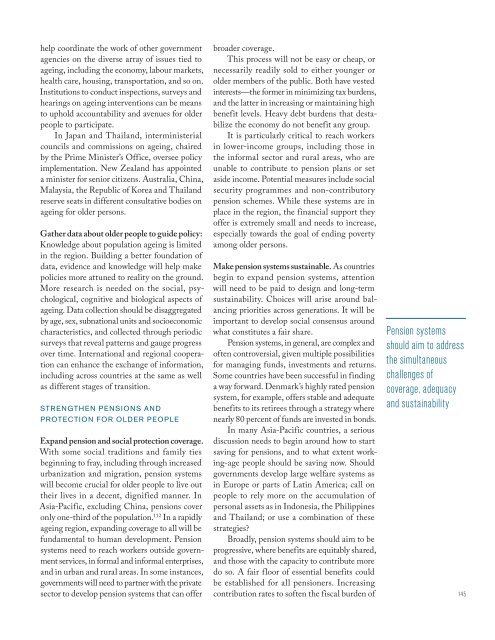SHAPING THE FUTURE HOW CHANGING DEMOGRAPHICS CAN POWER HUMAN DEVELOPMENT
1VPo4Vw
1VPo4Vw
You also want an ePaper? Increase the reach of your titles
YUMPU automatically turns print PDFs into web optimized ePapers that Google loves.
help coordinate the work of other government<br />
agencies on the diverse array of issues tied to<br />
ageing, including the economy, labour markets,<br />
health care, housing, transportation, and so on.<br />
Institutions to conduct inspections, surveys and<br />
hearings on ageing interventions can be means<br />
to uphold accountability and avenues for older<br />
people to participate.<br />
In Japan and Thailand, interministerial<br />
councils and commissions on ageing, chaired<br />
by the Prime Minister’s Office, oversee policy<br />
implementation. New Zealand has appointed<br />
a minister for senior citizens. Australia, China,<br />
Malaysia, the Republic of Korea and Thailand<br />
reserve seats in different consultative bodies on<br />
ageing for older persons.<br />
Gather data about older people to guide policy:<br />
Knowledge about population ageing is limited<br />
in the region. Building a better foundation of<br />
data, evidence and knowledge will help make<br />
policies more attuned to reality on the ground.<br />
More research is needed on the social, psychological,<br />
cognitive and biological aspects of<br />
ageing. Data collection should be disaggregated<br />
by age, sex, subnational units and socioeconomic<br />
characteristics, and collected through periodic<br />
surveys that reveal patterns and gauge progress<br />
over time. International and regional cooperation<br />
can enhance the exchange of information,<br />
including across countries at the same as well<br />
as different stages of transition.<br />
STRENG<strong>THE</strong>N PENSIONS AND<br />
PROTECTION FOR OLDER PEOPLE<br />
Expand pension and social protection coverage.<br />
With some social traditions and family ties<br />
beginning to fray, including through increased<br />
urbanization and migration, pension systems<br />
will become crucial for older people to live out<br />
their lives in a decent, dignified manner. In<br />
Asia-Pacific, excluding China, pensions cover<br />
only one-third of the population. 112 In a rapidly<br />
ageing region, expanding coverage to all will be<br />
fundamental to human development. Pension<br />
systems need to reach workers outside government<br />
services, in formal and informal enterprises,<br />
and in urban and rural areas. In some instances,<br />
governments will need to partner with the private<br />
sector to develop pension systems that can offer<br />
broader coverage.<br />
This process will not be easy or cheap, or<br />
necessarily readily sold to either younger or<br />
older members of the public. Both have vested<br />
interests—the former in minimizing tax burdens,<br />
and the latter in increasing or maintaining high<br />
benefit levels. Heavy debt burdens that destabilize<br />
the economy do not benefit any group.<br />
It is particularly critical to reach workers<br />
in lower-income groups, including those in<br />
the informal sector and rural areas, who are<br />
unable to contribute to pension plans or set<br />
aside income. Potential measures include social<br />
security programmes and non-contributory<br />
pension schemes. While these systems are in<br />
place in the region, the financial support they<br />
offer is extremely small and needs to increase,<br />
especially towards the goal of ending poverty<br />
among older persons.<br />
Make pension systems sustainable. As countries<br />
begin to expand pension systems, attention<br />
will need to be paid to design and long-term<br />
sustainability. Choices will arise around balancing<br />
priorities across generations. It will be<br />
important to develop social consensus around<br />
what constitutes a fair share.<br />
Pension systems, in general, are complex and<br />
often controversial, given multiple possibilities<br />
for managing funds, investments and returns.<br />
Some countries have been successful in finding<br />
a way forward. Denmark’s highly rated pension<br />
system, for example, offers stable and adequate<br />
benefits to its retirees through a strategy where<br />
nearly 80 percent of funds are invested in bonds.<br />
In many Asia-Pacific countries, a serious<br />
discussion needs to begin around how to start<br />
saving for pensions, and to what extent working-age<br />
people should be saving now. Should<br />
governments develop large welfare systems as<br />
in Europe or parts of Latin America; call on<br />
people to rely more on the accumulation of<br />
personal assets as in Indonesia, the Philippines<br />
and Thailand; or use a combination of these<br />
strategies?<br />
Broadly, pension systems should aim to be<br />
progressive, where benefits are equitably shared,<br />
and those with the capacity to contribute more<br />
do so. A fair floor of essential benefits could<br />
be established for all pensioners. Increasing<br />
contribution rates to soften the fiscal burden of<br />
Pension systems<br />
should aim to address<br />
the simultaneous<br />
challenges of<br />
coverage, adequacy<br />
and sustainability<br />
145


